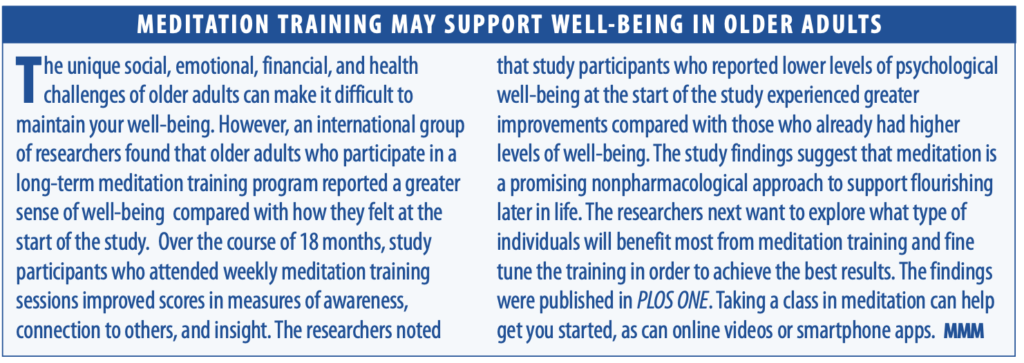Clear Away Brain Fog and Memory Troubles By Giving Your Mind a Rest
Cognitive stimulation—the kind associated with crossword puzzles, math games, and learning new hobbies—is a critical component of keeping your mind sharp and your memory robust. But is there a point at which you need to give your brain a break?
Yes, in fact, multiple breaks throughout the day can be critical in preserving healthy brain function, explains clinical neuropsychologist Christina Kay,PhD, with the Psychology Assessment Center at Massachusetts General Hospital.
“When we are actively engaged in goal-oriented work that requires higher-order thinking, we are heavily engaging the prefrontal cortex, a brain region linked to executive functioning,” she explains. “Overtaxing this area of the brain leaves less resources that could be appropriated for efficient cognitive processing. Studies have shown that taking short breaks can help boost focus and concentration. Once our brain has had a chance to rest and recharge, it becomes easier to return to a task with a renewed sense of focus and vitality.”
Other Benefits of Breaks Taking a break also helps with creativity, Dr. Kay says, suggesting that solutions to challenging projects can often be found when one stops focusing so much on the problem itself. “When we step awayfrom a demanding task or complex problem for a while, our brain continues to work on it in the background. This break can lead to new insights and ideas when we return to it, sparking creativity and better performance.”

The next time you’re stumped by a task, walk away and think about something else. Let your subconscious do some of the work while you’re resting.
Taking a break also reduces stress levels. “When we are constantly in action mode, our bodies releasestress hormones, such as cortisol, which can have negative effects on our health,” Dr. Kay says. “Breaks can help reduce cortisol and lower stress levels. It is no surprise that we are not as cognitively sharp when we are stressed. But many people may not realize that stress and overtaxing the brain may be hindering cognition in any given moment. For example, you may have had difficulty remembering a name, word, or fact when put on the spot or engaged for a long period of time, but this information may pop into your head later when you are relaxing. Lowering stress and restoring cognitive resources may be responsible for this.”
There’s an even more complex explanation for why breaks are good for the brain, and it has to do with the ways in which sleep supports better memory. Dr. Kay explains that electrochemical brain states (brain waves) play a role.
There are four types of brain waves: beta, alpha, theta, and delta. “In basic terms, beta waves equal working, thinking, and active attention. Alpha waves equal resting, though awake. Theta waves equal daydreaming or sleeping in a dream state. Delta waves equal deep sleep. We need to spend time in different brain states, including resting and engaging in relaxing activities that require less focus,” Dr. Kay says.
“Just as sleep states help build longterm memories, resting states help promote brain function. Some research suggests that the same memory/information consolidation activities that happen in our brains when we sleep also occur when we rest.”
What Counts as a “Real” Break?
For a break to truly offer some brain benefits, it needs to be something that truly takes you away from the activity that was occupying your mind.

© Thomas Barwick | Getty Images
To give your mind a rest, get away from TV, phone, and
computer screens for a bit and quietly take in some fresh air.
Dr. Kay explains that, from a cognitive perspective, resting and taking a break should require less input and/or a different type of stimulation than the focused activity. “For example, if you are hard at work at your computer, a good break would include walking outside, stretching, meditating, listening to music, or otherwise getting away from your computer screen,” she says. “Opening a new window to scroll social media or do online shopping isn’t the most helpful type of break because you haven’t incorporated movement and you are still subjecting yourself to ‘screen time’ input. Remember, the idea of a break is to take a breather from mental activity. It should be meditative so that you can go back to work with a relaxed frame of mind.”
Dr. Kay adds that, in general, disconnecting from technology is a great break for people always on screens. Just engaging in brief periods of quiet or closing your eyes and relaxing can work wonders.
Break Up Your Day
Try taking short breaks throughout the day, Dr. Kay advises. “Working in short bursts of time with short breaks in between sessions is also called time boxing,” she says. “This approach can help sustain attention and manage mental fatigue and/or frustration by ‘scheduling’ distractions.”
She notes that one common approach to time boxing is the Pomodoro technique, a time-management technique that breaks up work into approximately 25-minute intervals separated by five-minute breaks or approximately 50-minute work intervals separated by 10minute breaks. There are many free apps using these approaches and others to help you manage breaks.
Takeaway
While taking mental breaks is important for memory, concentration, and good problem-solving skills, there are times when sticking with a task is the better strategy.
“These things may seem slightly contradictory,” Dr. Kay begins. “On one hand, we need to make breaks more of a priority. In a culture that so highly emphasizes productivity and a focus on accomplishments, we need to keep in mind that breaks are not viewed as laziness or a luxury, but they are necessary to actually promote better productivity and maintain mental and physical well-being. Pay attention to when you are overloaded and need rest. Be kind to yourself and give yourself that time to recharge. But on the other hand, if you are working on something and in a state of flow, whereby ideas, creativity, and production are naturally coming (‘flowing’), then it is probably best to keep working until either the task is complete, or your flow has tampered. Taking a prescribed break during flow can actually disrupt your thought process and make it more difficulty to resume the task. Be mindful of your flow. Most people know when they are ‘in the zone.’”
And when you’re no longer “in the zone,” take a walk or meditate a little while. Your tasks and responsibilities will be there when you return.
The post Clear Away Brain Fog and Memory Troubles By Giving Your Mind a Rest appeared first on University Health News.
Read Original Article: Clear Away Brain Fog and Memory Troubles By Giving Your Mind a Rest »

